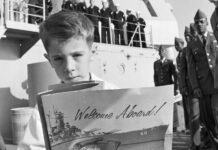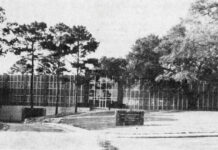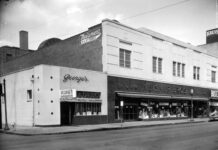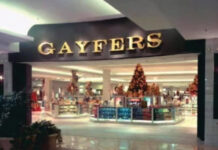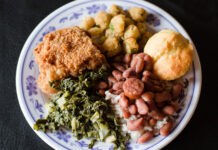
Long before radio, television, motion pictures and a plethora of sophisticated media, Mobilians had to find their contentment in books, newspapers and local theatres where touring celebrities lectured or entertained them. One such celebrated visitor to Mobile was the poet and playwright, Oscar Wilde, who had not yet written all the plays and poems that would make him famous, but had established himself as a person of fame and notoriety in Europe and Great Britain.
Born in Ireland and educated at Oxford, Wilde became a disciple of a movement known as Aestheticism, a natural expression of art and literature, and one that advocated outlandish and uncompromising extremes on both the creative and practical levels. Free from any moral or sensible considerations, it was “art for art’s sake.” Such a philosophy conflicted with mainstream Victorian culture, and was ridiculed in newspapers and literary circles. Yet Wilde, the eccentric young Irishman, embraced the movement, welcoming the attention and notoriety that came with it.
As a champion of Aestheticism, Wilde felt he was the perfect ambassador to introduce this new philosophy to the American public. What’s more, he was hopeful the money earned from his lectures would be substantial. Thus, he embarked on a year-long tour of the United States, sailing from London on the SS Arizona and landing in New York City in January of 1882. His lectures took him through cities and towns in the East, the Midwest, Far West, Canada and even a two month tour through the South.
Everywhere he went he created a hullabaloo, not so much for the content of his lectures, but for his peculiar appearance and delivery, which compelled people to admire him regardless of his ideas. He soon found himself the guest of honor at receptions and parties. Although Wilde’s every movement was well-covered by American newspapers, he was also an easy target for criticism, some of which was in good humor and some downright insulting. In truth, most Americans, especially Southerners, did not know what to make of the Irishman.
Here was a man whose appearance defied all conventionality. Physically, he stood tall for his times at six-feet-three-inches, with a perfectly straight posture. His dark-brown hair was parted down the middle, and hung over his shoulders in waves, surrounding a long baby-face with pouty lips, large teeth and deep-blue eyes. His attire always included patent-leather shoes, a fur-trimmed, long overcoat, long blue scarf, dark knee breeches and matching hose. He had a certain charm and gracious manner, and the tone and inflection of his speech were distinctive. Such a bizarre character in looks and demeanor was bound to attract newspaper cartoonists, who depicted Wilde’s caricature as strange and effeminate. But the flamboyant Wilde delighted in such public attention.
By the time Wilde reached Mobile on June 28, 1882, he had become a constant topic of conversation. He had also made a considerable amount of money from his lectures. The Mobile Daily Register, along with most newspapers, kept a running account of his every move as he traveled from city to city. One skeptical Alabama newspaperman was perplexed understanding the Irishman’s popularity, describing him as “the creature that so many silly people had gushed over.” Months before he arrived in Mobile, the Register focused on the huge sum of money Wilde had accumulated from his lectures, which the writer doubted was worth the price paid for admission. Yet no one could question the success of his tour. “Oscar Wilde,” the Register reported, “thinks a depleted pocket-book is not aesthetic, and he has come to this country to fill that article.”
While Mobile had not embraced aestheticism, and was not considered as sophisticated in art as New York or London, the city always had a love for the theater. This was especially true when the citizens could enjoy a time of cultural reprieve from the impoverished struggles they experienced in the years following the Civil War. By 1882, Mobile had already built seven theaters with the latest one being located at the corner of Conti and Royal. The theaters presented local talent and travelling actors in regular performances of dramas, comedies and operas. Also, the port city was the largest and oldest city in Alabama, with a population of over 29,000. With 3,000 foreign born citizens, Mobile was a cosmopolitan city, much like New Orleans, making it attractive for Frank Gray, Wilde’s agent, to include it in the tour.
On Wednesday, June 28, Wilde checked into the Battle House Hotel, and then attended a reception in his honor hosted by the wealthy Tomkins family, devout patrons of the theater. Because of his tight schedule, he could not remain in the city for long. But his visit was well-advertised, and Mobilians were anxious to hear and see the famous visitor.
Although a number of people were skeptical, thinking he was nothing more than a buffoon in extravagant clothing, they also knew he had attracted large audiences, and were curious to know why. Others were receptive to Wilde’s visit because of his open admiration for the Confederacy and the Lost Cause of the South. He made no secret of comparing Ireland’s struggle for independence from the British Empire with that of the South. In fact, after leaving New Orleans for Mobile, Wilde stopped at Beauvoir in Biloxi to visit with Jefferson and Varina Davis.
Whatever their reasons, Oscar Wilde was expected to draw an “immense gathering,” which would include “the cultured, the fashionable and the curious.” Because the local theaters closed during Mobile’s sweltering summers, the event would take place at Frascati Park. Located just a few miles south of the city on Mobile Bay, Frascati’s open-air theater enjoyed the cool breezes coming off the water. The grounds offered a premier site for entertainment, featuring large shade trees, a dance pavilion, a long wharf, a baseball park, as well as the open-air theater. It was widely known for attracting a more elite class of the society, pleasing Wilde, who had already announced: “I only care to speak to audiences that are educated and refined.”

The performance was not scheduled to commence until 8:30 that evening, but by 7 o’clock, carriages and street cars pulled by horses and mules were streaming down Bay Shell Road into the Frascati grounds. The event was a sell-out with the 300 reserved seats gone at once, and the rest, including those in the balcony, quickly disappearing. For all the intense excitement leading to his lecture, Oscar Wilde did not disappoint. Following the performance, the editor of the Daily Register admitted having misjudged Wilde.
“We confess to having gone to Frascati with decided prejudice against Mr. Wilde, but candor compels us to admit that such prejudice was unfounded . . . We heard a very chaste and finished lecture from quite a cultivated gentleman.” However, the editor was not without qualms concerning his appearance and manner: “We must put the grotesque dress, the long hair, the drawling voice, the poor elocution in one heap and the lecture itself in another,” As to his lecture, the editor believed Wilde’s ideas to be “as useful as they are attractive.”
Mobilians who attended the lecture also had a positive reaction. Although most were still unsure or bewildered over his message of the ideology of Aestheticism, they respected his intelligence, sincerity and polished manners. Even those who remained convinced that Wilde’s philosophy was nothing more than an intellectual sham designed to dupe the public out of their money, no one could dispute that the Irishman had been an influence in America.
Surprisingly, Wilde’s opinion of the people of Mobile and the South was more respectful than his opinion of any other area on his tour. “I like the Southern people, although you have let the Northern people get ahead of you in art, I think you are more adapted to the cultivation of art… You are of a warmer temperament and of a more imaginative turn of mind… a temperament infinitely more susceptible to the influences of beauty.” And as for the impressionable Mobilians, they would never forget the eccentric Oscar Wilde’s presence in their city.

